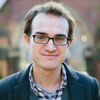
Christiaan De Beukelaer
- Course: PhD Media and Communication
- PhD title: From Cultural Development to Culture for Development: The Music Industries in Burkina Faso and Ghana
- Graduation: 2015
- Nationality: Belgian
- Job title: Senior Lecturer in Cultural Policy
- Company: University of Melbourne
Why did you choose to study your PhD at the University of Leeds?
I chose to pursue a PhD at the University of Leeds primarily because of my supervisor, David Hesmondhalgh. He is an internationally renowned authority on cultural industries, and after reading much of his work, the possibility of working with him on my project was a great prospect. From the moment I contacted him to discuss my project, he was very encouraging and curious to hear more about my plan to study cultural industries in African countries.
Tell us about the opportunities you took advantage of at Leeds.
One of the main strengths of the School of Media and Communication at the University of Leeds is the very active and diverse research culture. Because of my interdisciplinary background (in musicology, cultural studies, and development studies), it was great to attend research seminars on journalism, media studies, creative labour, and cultural theory. These experiences both helped building a cohort among PhD students and provided opportunities to connect to the large and diverse group of leading scholars who work in the School.
How has your experience of studying a PhD helped you in your career?
At the School of Media and Communication, we were encouraged to take initiative and think ahead. This manifested in two ways that helped me prepare for life as an academic.
First, I co-organised several events and conferences, both within the School and beyond. Two of the main things I was involved in were the organisation of the MeCCSA Postgraduate Network Conference in 2014 and the Researchers in Development PhD Network (RiDNet), with fellow PhD students from different Schools and Faculties.
Second, the School organised a range of seminars that helped us navigating the ins and outs of academic life, through sessions on publishing, applying for jobs, etc. These moments, alongside the opportunity to sit in on research presentations of job candidates, were invaluable when looking for jobs later down the track.
In my current position as a senior lecturer, I believe these activities have helped me get stable employment as an academic. But, more importantly, they have also helped me develop the habits and skills that any academic needs.
What advice would you give to future PhD students?
Think strategically about what you want and need to accomplish during your PhD, in function of your post-doctoral plans. A PhD is not enough to make it in academia, but no one has time to do the work required to tick all the boxes. The School of Media and Communication is a great place to find your feet thanks to the generosity of academics and fellow PhD students to discuss how to best tackle these difficult questions. I am proud to say I’m part of a network of alumni of the School of Media and Communication at the University of Leeds, and it’s always a pleasure to meet up with fellow alumni, whether it’s in Cape Town, Kuala Lumpur, Washington DC, or back in Leeds.

